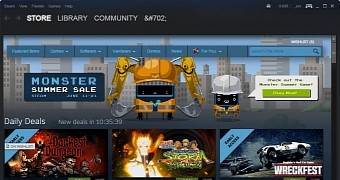The Steam Summer Sale, which this year came with an attached video game featuring monsters, ended on June 20 officially but a set of encores ran another two days after that, which probably means that many gamers are still contemplating the titles they have bought and the damage done to their wallets.
Valve has a policy of not releasing information about the increases in sales generated by its major promotions or about the money that the community spends, but I think it is safe to say that this was one of the biggest moments in PC gaming in 2015.
A wide variety of video games were offered with very deep discounts and the community was able to bring big cuts for even more titles by playing a little simple game that involved a variety of monsters and a lot of upgrades and clicking.
Now, with the launch schedule over the coming two months relatively bare, gamers will have the time to actually dig into the titles that they have picked up from the Steam Summer Sale and experience some of the titles they have got because of recommendations from friends or awards received.
Big sales are a controversial topic
Some developers have criticized the concept of sales, especially the big ones that discount hundreds of titles at the same time, because they actually hurt the video game industry by showing gamers that they can get all titles for low prices as long as they are willing to wait.
Other believe that these regular events are a great way for players to get titles that they would not consider otherwise and to discover new experiences that they might become fans of, which is a positive development.
But the Steam Summer Sale does not need to evolve because it might be damaging to the video games ecosystem, but because Valve has always been known for innovating and has been stuck doing the same thing for the last few years.
Sure, the game associated with the most recent event was cute and managed to make a lot of PC players click a lot in order to get some more rewards in the form of cards for their badges and to spend more money, but this is not innovation.
Valve needs to put Steam sales to better use
One major problem that the digital distribution service has on the PC is the fact that there are too many titles available, with more added each week.
A huge number of them get discounts, both every week and during special events, competing for the attention of gamers.
Curators, recommendations and gifts have been introduced to help the community sift through the numbers and to make sure that the best titles are getting the audience they deserve, but this is not enough.
Valve has managed to create a meta-game for the Steam Summer Sale based around spending, cards and clicking.
It should use that creative energy to find a way to make sure that the best titles from the history of PC gaming get in the library of as many people as possible.
The company could also try to highlight innovative new games, indies that break the constraints of a genre or other experiences that are worthy of attention.
It's great for gamers that they can pick up video games on the cheap, but it would be even better for them to have a way to get the titles that they will actually play and enjoy rather than those that will remain in their backlog for years.
Valve is an innovative company that knows how to interact with the PC gaming community.
It should use these advantages and its massive resources to find a way to make the summer sale something more than a spending bonanza.

 14 DAY TRIAL //
14 DAY TRIAL //